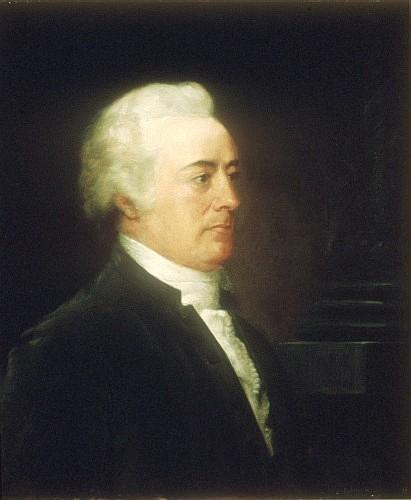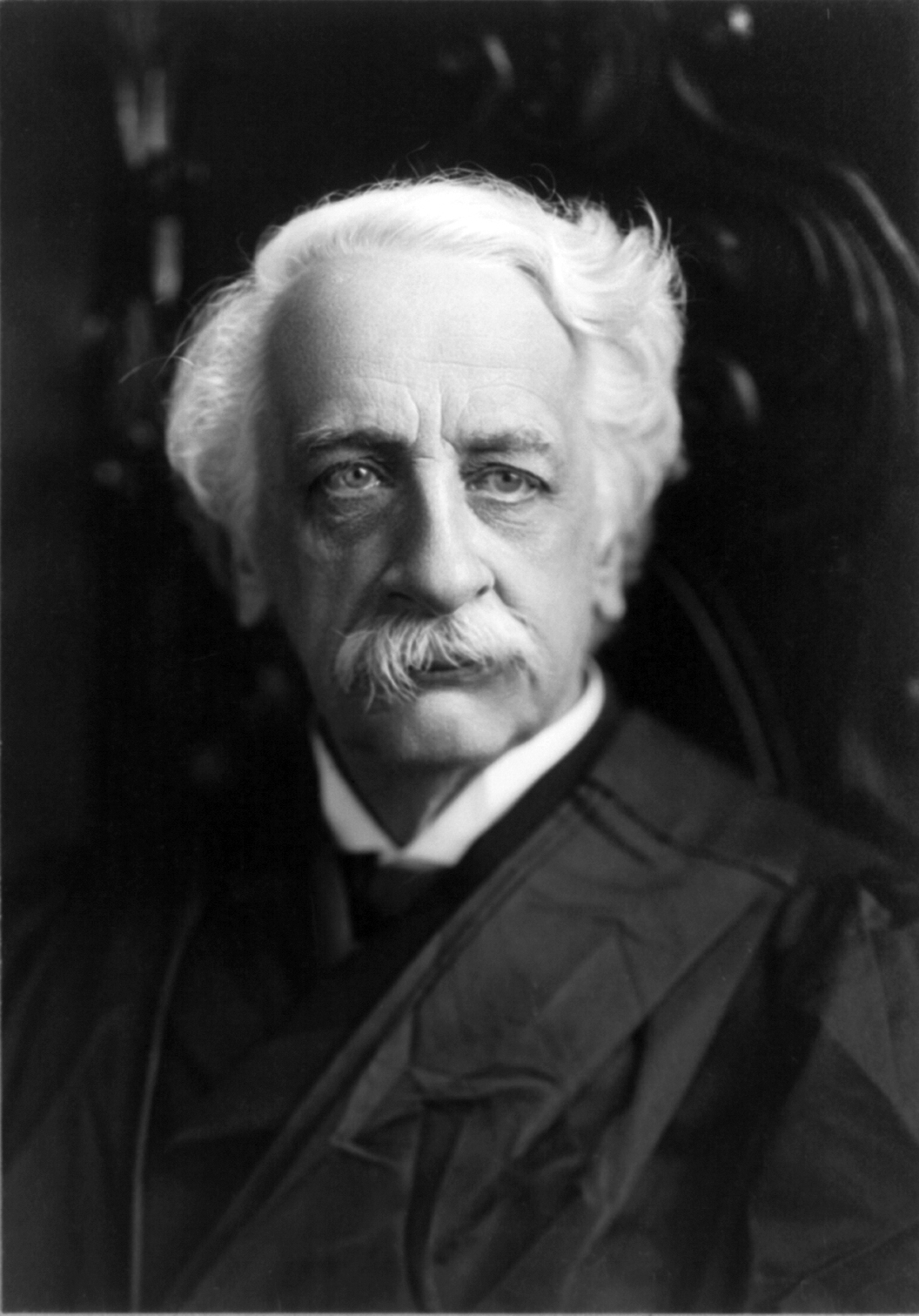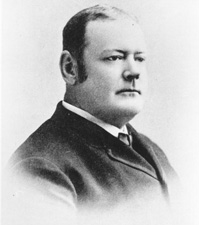|
Rufus W. Peckham
Rufus W. Peckham (November 8, 1838 – October 24, 1909) was an American lawyer and jurist who served as an Associate Justice of the U.S. Supreme Court from 1895 to 1909, and is the most recent Democratic nominee approved by a Republican-majority Senate. He was known for his strong use of substantive due process to invalidate regulations of business and property. Peckham's namesake father was also a lawyer and judge, and a U.S. Representative. His older brother, Wheeler Hazard Peckham (1833–1905), was one of the lawyers who prosecuted William M. Tweed and a failed nominee to the Supreme Court. Biography Peckham was born in Albany, New York, to Rufus Wheeler Peckham and Isabella Adeline Lacey; his mother died when he was only nine. Following his graduation from The Albany Academy, he followed in his father's footsteps as a lawyer, being admitted to the bar in Albany in 1859 after teaching himself law by studying in his father's office. After a decade of private practice, Pe ... [...More Info...] [...Related Items...] OR: [Wikipedia] [Google] [Baidu] |
Associate Justice Of The Supreme Court Of The United States
An associate justice of the Supreme Court of the United States is any member of the Supreme Court of the United States other than the chief justice of the United States. The number of associate justices is eight, as set by the Judiciary Act of 1869. Article II, Section 2, Clause 2 of the Constitution of the United States grants plenary power to the president to nominate, and with the advice and consent (confirmation) of the Senate, appoint justices to the Supreme Court. Article III, Section 1 of the Constitution effectively grants life tenure to associate justices, and all other federal judges, which ends only when a justice dies, retires, resigns, or is removed from office by impeachment. Each Supreme Court justice has a single vote in deciding the cases argued before it, and the chief justice's vote counts no more than that of any other justice; however, the chief justice leads the discussion of the case among the justices. Furthermore, the chief justice—when in the ... [...More Info...] [...Related Items...] OR: [Wikipedia] [Google] [Baidu] |
Cornelius Vanderbilt
Cornelius Vanderbilt (May 27, 1794 – January 4, 1877), nicknamed "the Commodore", was an American business magnate who built his wealth in railroads and shipping. After working with his father's business, Vanderbilt worked his way into leadership positions in the inland water trade and invested in the rapidly growing railroad industry, effectively transforming the geography of the United States. As one of the richest Americans in history and wealthiest figures overall, Vanderbilt was the patriarch of the wealthy and influential Vanderbilt family. He provided the initial gift to found Vanderbilt University in Nashville, Tennessee. According to historian H. Roger Grant: "Contemporaries, too, often hated or feared Vanderbilt or at least considered him an unmannered brute. While Vanderbilt could be a rascal, combative and cunning, he was much more a builder than a wrecker ..being honorable, shrewd, and hard-working." Ancestry Cornelius Vanderbilt's great-great-great-grandf ... [...More Info...] [...Related Items...] OR: [Wikipedia] [Google] [Baidu] |
African Americans
African Americans (also referred to as Black Americans and Afro-Americans) are an ethnic group consisting of Americans with partial or total ancestry from sub-Saharan Africa. The term "African American" generally denotes descendants of Slavery in the United States, enslaved Africans who are from the United States. While some Black immigrants or their children may also come to identify as African-American, the majority of first generation immigrants do not, preferring to identify with their nation of origin. African Americans constitute the second largest racial group in the U.S. after White Americans, as well as the third largest ethnic group after Hispanic and Latino Americans. Most African Americans are descendants of enslaved people within the boundaries of the present United States. On average, African Americans are of West Africa, West/Central Africa, Central African with some European descent; some also have Native Americans in the United States, Native American and othe ... [...More Info...] [...Related Items...] OR: [Wikipedia] [Google] [Baidu] |
Sherman Antitrust Act Of 1890
The Sherman Antitrust Act of 1890 (, ) is a United States antitrust law which prescribes the rule of free competition among those engaged in commerce. It was passed by Congress and is named for Senator John Sherman, its principal author. The Sherman Act broadly prohibits 1) anticompetitive agreements and 2) unilateral conduct that monopolizes or attempts to monopolize the relevant market. The Act authorizes the Department of Justice to bring suits to enjoin (i.e. prohibit) conduct violating the Act, and additionally authorizes private parties injured by conduct violating the Act to bring suits for treble damages (i.e. three times as much money in damages as the violation cost them). Over time, the federal courts have developed a body of law under the Sherman Act making certain types of anticompetitive conduct per se illegal, and subjecting other types of conduct to case-by-case analysis regarding whether the conduct unreasonably restrains trade. The law attempts to preve ... [...More Info...] [...Related Items...] OR: [Wikipedia] [Google] [Baidu] |
Rufus Wheeler Peckham Grave
Rufus is a masculine given name, a surname, an Ancient Roman cognomen and a nickname (from Latin '' rufus'', "red"). Notable people with the name include: Given name Politicians * Rufus Ada George (born 1940), Nigerian politician * Rufus Aladesanmi III (born 1945), Yoruban king * Rufus Applegarth (1844–1921), American lawyer and politician * Rufus A. Ayers (1849–1926), American lawyer, businessman, and politician * Rufus Barringer (1821–1895), American lawyer, politician, and military general * Rufus Blodgett (1834–1910), American politician and railroad superintendent * Rufus Bousquet (born 1958), Saint Lucian politician * Rufus E. Brown (1854–1920), Vermont attorney, farmer, and politician * Rufus Bullock (1834–1907), American politician * Rufus Carter (1866–1932), Canadian farmer and political figure * Rufus Cheney Jr., member of the Wisconsin State Assembly during the 1850 session * Rufus W. Cobb (1829–1913), American politician * Rufus Curry (18 ... [...More Info...] [...Related Items...] OR: [Wikipedia] [Google] [Baidu] |
Lochner V
''Lochner v. New York'', 198 U.S. 45 (1905), was a landmark decision of the U.S. Supreme Court in which the Court ruled that a New York state law setting maximum working hours for bakers violated the bakers' right to freedom of contract under the Fourteenth Amendment to the U.S. Constitution. The decision has been effectively overturned. The underlying case began in 1899 when Joseph Lochner, a German immigrant who owned a bakery in Utica, New York, was charged with violating New York's Bakeshop Act of 1895. The Bakeshop Act had made it a crime for New York bakeries to employ bakers for more than 10 hours per day or 60 hours per week. He was convicted and ultimately appealed to the U.S. Supreme Court. A five-justice majority of the Supreme Court held that the law violated the due process clause, stating that the law constituted an "unreasonable, unnecessary and arbitrary interference with the right and liberty of the individual to contract". Four dissenting justices rejected ... [...More Info...] [...Related Items...] OR: [Wikipedia] [Google] [Baidu] |
Majority Opinion
In law, a majority opinion is a judicial opinion agreed to by more than half of the members of a court. A majority opinion sets forth the decision of the court and an explanation of the rationale behind the court's decision. Not all cases have a majority opinion. At times, the justices voting for a majority decision (e.g., to affirm or reverse the lower court's decision) may have drastically different reasons for their votes, and cannot agree on the same set of reasons. In that situation, several concurring opinions may be written, none of which is the view of a majority of the members of the court. Therefore, the concurring opinion joined by the greatest number of judges is referred to as the plurality opinion. Normally, appellate courts (or panels) are staffed with an odd number of judges to avoid a tie. Sometimes, and in some jurisdictions, when judicial positions are vacant or a judge has recused themselves from the case, the court may be stuck with a tie, in which c ... [...More Info...] [...Related Items...] OR: [Wikipedia] [Google] [Baidu] |
Laissez-faire
''Laissez-faire'' ( ; from french: laissez faire , ) is an economic system in which transactions between private groups of people are free from any form of economic interventionism (such as subsidies) deriving from special interest groups. As a system of thought, ''laissez-faire'' rests on the following axioms: "the individual is the basic unit in society, i.e. the standard of measurement in social calculus; the individual has a natural right to freedom; and the physical order of nature is a harmonious and self-regulating system." Another basic principle of ''laissez-faire'' holds that markets should naturally be competitive, a rule that the early advocates of ''laissez-faire'' always emphasized. With the aims of maximizing freedom by allowing markets to self-regulate, early advocates of ''laissez-faire'' proposed a ''impôt unique'', a tax on land rent (similar to Georgism) to replace all taxes that they saw as damaging welfare by penalizing production. Proponents of ' ... [...More Info...] [...Related Items...] OR: [Wikipedia] [Google] [Baidu] |
Oath Of Office
An oath of office is an oath or affirmation a person takes before assuming the duties of an office, usually a position in government or within a religious body, although such oaths are sometimes required of officers of other organizations. Such oaths are often required by the laws of the state, religious body, or other organization before the person may actually exercise the powers of the office or organization. It may be administered at an inauguration, coronation, enthronement, or other ceremony connected with the taking up of office itself, or it may be administered privately. In some cases it may be administered privately and then repeated during a public ceremony. Some oaths of office are statements of allegiance and loyalty to a constitution or other legal text or to a person or office-holder (e.g., an oath to support the constitution of the state, or of loyalty to the king or queen) (see Oath of allegiance). Under the laws of a state, it may be considered treason or ... [...More Info...] [...Related Items...] OR: [Wikipedia] [Google] [Baidu] |
Edward Douglass White
Edward Douglass White Jr. (November 3, 1844 – May 19, 1921) was an American politician and jurist from Louisiana. White was a Supreme Court of the United States, U.S. Supreme Court justice for 27 years, first as an Associate Justice of the Supreme Court of the United States, associate justice from 1894 to 1910, then as the ninth Chief Justice of the United States, chief justice from 1910 until his death in 1921. White is known for formulating the ''Rule of reason, Rule of Reason'' standard of United States antitrust law, antitrust law. Born in Lafourche Parish, Louisiana, White practiced law in New Orleans after graduating from the Tulane University, University of Louisiana. He also attended the College of the Immaculate Conception, present-day Jesuit High School (New Orleans), Jesuit High School in New Orleans, class of 1865. His father, Edward Douglass White Sr., was the 10th Governor of Louisiana and a Whig Party (United States), Whig United States House of Representatives, ... [...More Info...] [...Related Items...] OR: [Wikipedia] [Google] [Baidu] |
David B
David Robert Jones (8 January 194710 January 2016), known professionally as David Bowie ( ), was an English singer-songwriter and actor. A leading figure in the music industry, he is regarded as one of the most influential musicians of the 20th century. Bowie was acclaimed by critics and musicians, particularly for his innovative work during the 1970s. His career was marked by reinvention and visual presentation, and his music and stagecraft had a significant impact on popular music Popular music is music with wide appeal that is typically distributed to large audiences through the music industry. These forms and styles can be enjoyed and performed by people with little or no musical training.Popular Music. (2015). ''Funk .... Bowie developed an interest in music from an early age. He studied art, music and design before embarking on a professional career as a musician in 1963. "Space Oddity", released in 1969, was his first top-five entry on the UK Singles Chart. Afte ... [...More Info...] [...Related Items...] OR: [Wikipedia] [Google] [Baidu] |
United States Senate
The United States Senate is the upper chamber of the United States Congress, with the House of Representatives being the lower chamber. Together they compose the national bicameral legislature of the United States. The composition and powers of the Senate are established by Article One of the United States Constitution. The Senate is composed of senators, each of whom represents a single state in its entirety. Each of the 50 states is equally represented by two senators who serve staggered terms of six years, for a total of 100 senators. The vice president of the United States serves as presiding officer and president of the Senate by virtue of that office, despite not being a senator, and has a vote only if the Senate is equally divided. In the vice president's absence, the president pro tempore, who is traditionally the senior member of the party holding a majority of seats, presides over the Senate. As the upper chamber of Congress, the Senate has several powers ... [...More Info...] [...Related Items...] OR: [Wikipedia] [Google] [Baidu] |

.jpg)






.png)
